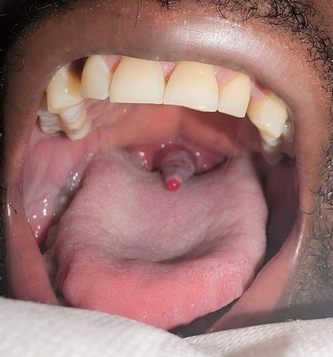Sunday Poster Session
Category: General Endoscopy
P0871 - Caught Between the Scope and Hard Palate: A Case of Uvular Necrosis Post-ERCP
Sunday, October 26, 2025
3:30 PM - 7:00 PM PDT
Location: Exhibit Hall
.jpg)
Archit Garg, MD (he/him/his)
Saint Peter's University Hospital / Rutgers Robert Wood Johnson Medical School
New Brunswick, NJ
Presenting Author(s)
Archit Garg, MD1, Abhishek Chouthai, MD1, Sunny Kumar, MD2, Sahil Raval, MD1, Andrew Korman, MD1
1Saint Peter's University Hospital / Rutgers Robert Wood Johnson Medical School, New Brunswick, NJ; 2Wright Center for Graduate Medical Education, Scranton, PA
Introduction: Uvular trauma is a rare complication of upper endoscopy procedures, often resulting from endoscope-induced pressure on the uvula or vigorous oropharyngeal suctioning. Symptoms include sore throat, foreign body sensation, odynophagia, dysphagia, and fever. Early identification is crucial as uvular necrosis can lead to airway obstruction, bleeding, infection, and even perforation. Management is typically conservative, but close monitoring is necessary. Here, we present a rare case of uvular necrosis following an upper endoscopic procedure.
Case Description/
Methods: A 57-year-old male with hyperlipidemia and a pancreatic head mass presented with six weeks of worsening epigastric pain and jaundice. He underwent ERCP with EUS/FNA for tissue diagnosis with biopsy and biliary decompression with stent placement. The procedure itself was technically successful without immediate adverse events.However, that night, the patient developed significant throat irritation, a persistent foreign body sensation, pain, and heaviness localized to the back of his throat, exacerbated by lying supine. Physical examination revealed an enlarged, black-discolored uvula with an adherent moderate-sized blood clot, surrounded by oropharyngeal erythema and swelling. His airway was patent (Mallampati class 4 noted), with no stridor, respiratory distress, or active bleeding. A CT soft tissue neck ruled out retained foreign bodies or deep space collections. Otolaryngology diagnosed uvular necrosis secondary to endoscope trauma during the ERCP. The patient was managed conservatively with intravenous dexamethasone (for inflammation), analgesics, mouthwash, and diet modification, leading to gradual symptom resolution.
Discussion: Uvular necrosis is a rare complication of upper endoscopy, typically caused by direct endoscope trauma compressing the uvula against the pharynx or excessive suctioning, leading to vascular compromise and ischemic necrosis. Key risk factors include male sex, large neck circumference, and difficult airways (e.g., Mallampati 4). Patients present with acute sore throat, odynophagia, dysphagia, and foreign body sensation. Diagnosis is clinical, identifying a swollen, black-discolored necrotic uvula. Management is conservative with steroids to reduce inflammation, analgesics control pain, and supportive care (soft diet, mouthwash) aids healing. Symptoms typically resolve within 4-7 days; surgery is rarely needed. Prevention focuses on gentle technique and airway assessment in high-risk patients.

Figure: Figure 1: Examination of the oral cavity showing swollen discolored uvula

Figure: Figure 2: Examination of the oral cavity showing swollen uvula
Disclosures:
Archit Garg indicated no relevant financial relationships.
Abhishek Chouthai indicated no relevant financial relationships.
Sunny Kumar indicated no relevant financial relationships.
Sahil Raval indicated no relevant financial relationships.
Andrew Korman indicated no relevant financial relationships.
Archit Garg, MD1, Abhishek Chouthai, MD1, Sunny Kumar, MD2, Sahil Raval, MD1, Andrew Korman, MD1. P0871 - Caught Between the Scope and Hard Palate: A Case of Uvular Necrosis Post-ERCP, ACG 2025 Annual Scientific Meeting Abstracts. Phoenix, AZ: American College of Gastroenterology.
1Saint Peter's University Hospital / Rutgers Robert Wood Johnson Medical School, New Brunswick, NJ; 2Wright Center for Graduate Medical Education, Scranton, PA
Introduction: Uvular trauma is a rare complication of upper endoscopy procedures, often resulting from endoscope-induced pressure on the uvula or vigorous oropharyngeal suctioning. Symptoms include sore throat, foreign body sensation, odynophagia, dysphagia, and fever. Early identification is crucial as uvular necrosis can lead to airway obstruction, bleeding, infection, and even perforation. Management is typically conservative, but close monitoring is necessary. Here, we present a rare case of uvular necrosis following an upper endoscopic procedure.
Case Description/
Methods: A 57-year-old male with hyperlipidemia and a pancreatic head mass presented with six weeks of worsening epigastric pain and jaundice. He underwent ERCP with EUS/FNA for tissue diagnosis with biopsy and biliary decompression with stent placement. The procedure itself was technically successful without immediate adverse events.However, that night, the patient developed significant throat irritation, a persistent foreign body sensation, pain, and heaviness localized to the back of his throat, exacerbated by lying supine. Physical examination revealed an enlarged, black-discolored uvula with an adherent moderate-sized blood clot, surrounded by oropharyngeal erythema and swelling. His airway was patent (Mallampati class 4 noted), with no stridor, respiratory distress, or active bleeding. A CT soft tissue neck ruled out retained foreign bodies or deep space collections. Otolaryngology diagnosed uvular necrosis secondary to endoscope trauma during the ERCP. The patient was managed conservatively with intravenous dexamethasone (for inflammation), analgesics, mouthwash, and diet modification, leading to gradual symptom resolution.
Discussion: Uvular necrosis is a rare complication of upper endoscopy, typically caused by direct endoscope trauma compressing the uvula against the pharynx or excessive suctioning, leading to vascular compromise and ischemic necrosis. Key risk factors include male sex, large neck circumference, and difficult airways (e.g., Mallampati 4). Patients present with acute sore throat, odynophagia, dysphagia, and foreign body sensation. Diagnosis is clinical, identifying a swollen, black-discolored necrotic uvula. Management is conservative with steroids to reduce inflammation, analgesics control pain, and supportive care (soft diet, mouthwash) aids healing. Symptoms typically resolve within 4-7 days; surgery is rarely needed. Prevention focuses on gentle technique and airway assessment in high-risk patients.

Figure: Figure 1: Examination of the oral cavity showing swollen discolored uvula

Figure: Figure 2: Examination of the oral cavity showing swollen uvula
Disclosures:
Archit Garg indicated no relevant financial relationships.
Abhishek Chouthai indicated no relevant financial relationships.
Sunny Kumar indicated no relevant financial relationships.
Sahil Raval indicated no relevant financial relationships.
Andrew Korman indicated no relevant financial relationships.
Archit Garg, MD1, Abhishek Chouthai, MD1, Sunny Kumar, MD2, Sahil Raval, MD1, Andrew Korman, MD1. P0871 - Caught Between the Scope and Hard Palate: A Case of Uvular Necrosis Post-ERCP, ACG 2025 Annual Scientific Meeting Abstracts. Phoenix, AZ: American College of Gastroenterology.
